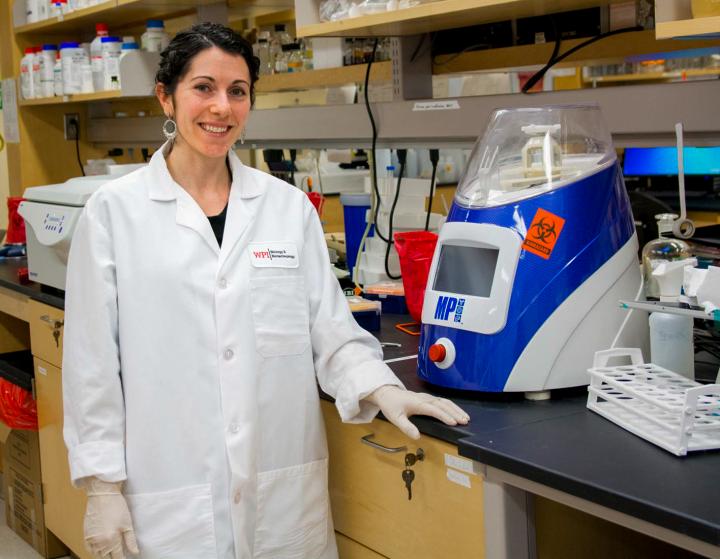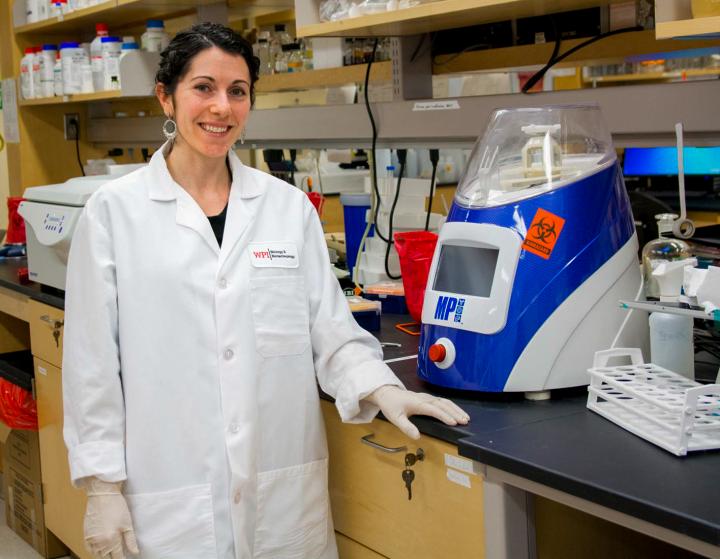
Credit: Worcester Polytechnic Institute (WPI)
Worcester, Mass. – As a graduate student, Scarlet Shell spent four months in rural and urban clinics in Peru studying the pathogens that cause malaria and tuberculosis. Seeing firsthand the ravages those diseases visit on vulnerable populations set her on a career path of discovery.
Now, as an assistant professor of biology and biotechnology at Worcester Polytechnic Institute (WPI), Shell has received a $1.1 million CAREER Award from the National Science Foundation (NSF) for a five-year program to study the molecular mechanisms bacteria use to survive stressful conditions of starvation and lack of oxygen. The CAREER program is the NSF's most competitive and prestigious award for young faculty members "who exemplify the role of teacher-scholars through outstanding research, excellent education, and the integration of education and research."
"I've always been interested in the science of infectious diseases and the molecular mechanisms of infection, but seeing people with limited access to healthcare suffering from these diseases made clear for me the link between basic research and clinical medicine," Shell said. "To help people, we need to know more about the molecular biology of bacteria. So I am honored to receive this award from the NSF to further our research and to enrich the educational experience of our students who will have a real role in elements of this program."
Many species of bacteria are adept at surviving hostile conditions, such as environmental stresses, attacks from a host's immune system, or antibiotic drugs. When stressed, the bacteria cells stop growing, presumably to conserve energy and bolster their defenses. Those changes are accomplished by modified instructions sent by the bacteria's genes in the form of molecules of messenger RNA (mRNA). Very little is known about how those mRNAs are affected under stress.
Working with the model organism Mycobacterium smegmatis, a relative of Mycobacterium tuberculosis that does not cause disease in people, Shell will probe the differing patterns of mRNAs that flow from the bacteria's 6,000 genes while the cells are starved for nutrients or cultured in low oxygen. Her team will dig deep, looking at how the building blocks of mRNA molecules change under stress in comparison to those in "healthy" cells that are growing. The work will also analyze which areas along the bacteria's genome become more or less active while under stress.
Extracting and analyzing every mRNA molecule from a smegmatis cell is a major technical challenge. In earlier work as a postdoctoral researcher at Harvard University, Shell developed a novel approach to do so, an intense process that involves up to one billion mRNA molecules in every experiment. Shell predicts that the fundamental biological mechanisms that allow bacteria to survive stress are similar across many species–whether human pathogens or environmental bacteria that dwell in soil or water–so her studies could have broad impact across many fields.
A better understanding of the molecular biology of tuberculosis bacteria, for example, could open new lines of research for advanced treatments of what the World Health Organization (WHO) calls a major global health threat. In its most recent report on the disease, the WHO estimated 10.4 million new cases of tuberculosis occurred in 2015 with 1.4 million fatalities worldwide. Six countries account for 60 percent of the new cases of tuberculosis, the WHO reports: India, Indonesia, China, Nigeria, Pakistan, and South Africa. Of great concern globally are the 480,000 new cases of multidrug-resistant strains of tuberculosis seen in 2015. "Much of what we learn in smegmatis will be applicable to tuberculosis," Shell said. "Our focus is on the basic science, to fill a knowledge gap and create a foundation for future advances in the field."
A core element of the NSF CAREER program is to enrich educational experiences for university and secondary school students to inspire them to consider careers in science. Through the new grant, Shell will adapt several courses she teaches at WPI and put students to work on aspects of the bacterial mRNA analysis. Shell has also developed a summer research experience for several Worcester area high school students who will write code to predict the functions of proteins in the bacteria.
"This CAREER Award is a major milestone and important recognition of the outstanding work Professor Shell is doing," said Joseph Duffy, PhD, head of WPI's Biology and Biotechnology Department. "We look forward to the discoveries that will flow from her inquiry and to the positive impact of authentic research experiences for our students."
###
About Worcester Polytechnic Institute
Founded in 1865 in Worcester, Mass., WPI is one of the nation's first engineering and technology universities. Its 14 academic departments offer more than 50 undergraduate and graduate degree programs in science, engineering, technology, business, the social sciences, and the humanities and arts, leading to bachelor's, master's and doctoral degrees. WPI's talented faculty work with students on interdisciplinary research that seeks solutions to important and socially relevant problems in fields as diverse as the life sciences and bioengineering, energy, information security, materials processing, and robotics. Students also have the opportunity to make a difference to communities and organizations around the world through the university's innovative Global Projects Program. There are more than 45 WPI project centers throughout the Americas, Africa, Asia-Pacific, and Europe.
Media Contact
Michael Cohen
[email protected]
508-868-4778
@WPI
http://www.wpi.edu
############
Story Source: Materials provided by Scienmag





